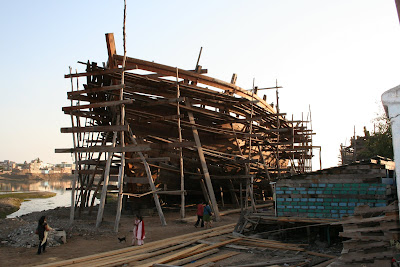A little Nepalese boy, Nitesh, is bouncing a soccer ball on a dirt path trekked hourly, daily, seasonally, by foreigners in the Himalayan foothills. Your friend’s brother, who picked you up from the airport a couple days earlier, told you that soccer, err, football, is the favored sport here. Not cricket, like in India. Still, at 6:30am the previous morning, while jogging with your sister in Kathmandu, you watched a group of Indian boys, living in Nepal, playing cricket. But this boy, Nitesh, 5 yrs old, up to your own knees, with his shaved head and mischievous smile, is bouncing his soccer ball through his legs. Basketball. He’s imitating a basketball player, with his soccer ball, on a dirt path, in a village near Dampus, in Nepal. 5 Dutch travelers - sun burnt, silent, thick - trek by. You wonder if they’ve been arguing. It’s that kind of silence. Or maybe it’s the exhaustion seeping inwards from their sunburns. Namaste, they say, without expression. To you or to the boy you’re watching, you’re not quite sure. The boy resumes his bouncing, careless to the foreigners, of which you are just one, and your constant gaze. He’s dribbling his soccer ball like a basketball. You know basketball. You love basketball, the game, and everything it gave you. And even though you don’t play much these days Everything It Gave You is with you in everything you do.
Right now all you know is that you love watching this kid with his shaved head and mischievous smile bounce his soccer ball. But, you notice his nose is running. You’re not sure why. You hate that his nose is running because it’s so cliché. This child is happy. He’s playing, in the mountains, his family lives and works 5 ft from the path he’s dribbling on. There’s a school being built just below his house. A school with a blue door in the front yard. He’s better off, you think to yourself, in this village with his family and this soon-to-be-new-school, with these foreigners coming through, than on the streets of Kathmandu, breathing in bags full of dendrite, smoking beedies, with other little boys, until his eyes burn red, head goes light, falling asleep in piles on the sidewalk. And yet, his nose is running. Just like theirs. You hate that you are thinking about his runny nose. He bounces the ball quickly behind his back. Nice move, you think. But not nice enough, because you steal the ball, dribble in circles around him, as he giggles and tries to catch it. Then he gets shy and stops, you decide to be nice and give the ball back. He goes back to his own dribbling.
You have a naïve thought: How does he know how to play basketball up here, so high in this village. How does he know to use that soccer ball with his hands, between his legs, behind his back? Where did he, only 5 yrs on this earth so far, learn those moves? And then you remember the sound of voices streaming through the other villages you trekked through. TVs. Yes, of course, how else do we know about things we’ve never seen first hand? TV! Even if there’s only electricity a couple hours a day, there is still TV!
And you remember some article written by some smart people at some private school in Cambridge. ‘What poor people spend their money on’, or something like that, was the title. TVs. Poor people in poor countries spend a lot of money of TVs. And, weddings. Yes, lots of money on weddings. You wonder when this boy, Nitesh, will get married. Will he be in love? Will he be nervous? Will she be from the same village? You wonder whether he is even poor. You wonder. His older sister is making you breakfast, because you’re a guest in their guest-house. His older sister, like your own, will be getting married sooner. Lots of money will be spent on her wedding. You decide to leave a bigger tip when you leave. You flinch at yourself for having this thought, but decide to own up to it, the thought, anyways.






